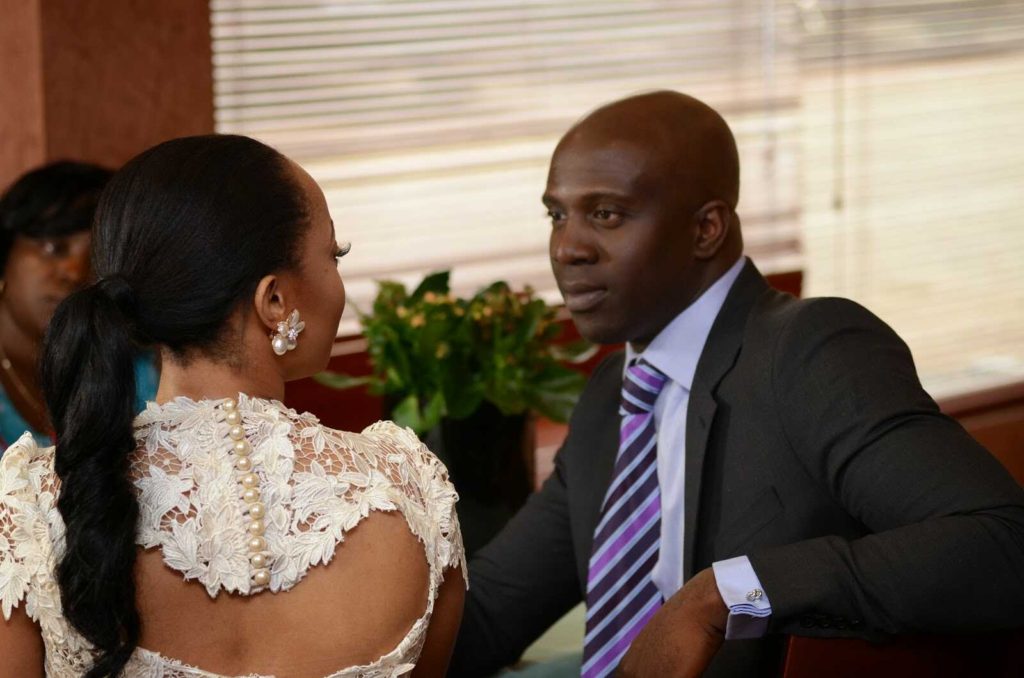Many have opined that “On Becoming,” a controversial memoir, was written essentially to garner sympathy from other scorned women, and from the society; some have labelled it hagiography, a piece of literature about someone’s life which portrays it as better than it really is or was. Others are certain that ‘On Becoming’ is a cold dish of revenge, which Toke Makinwa, the author, has decided to serve her estranged husband for the shame he put her through when the world discovered that his mistress was nine months pregnant. And, finally, there are those who believe that she was trying to make lemonade out of the lemons she was handed.
The memoir is not a kiss and tell. It’s not the diary of a mad black woman; neither is it about a woman scorned. “On Becoming” is about a woman suffering from a traumatic event, which wrecked her childhood. It is about a woman with a daddy-void. It’s also about a woman who has accepted her mistakes, agrees she has unresolved issues, and is ready to do something about them.
Although the memoir highlights some of the problems in our society, it offers a few solutions. The solutions it provides only tackle the problem in an adult with full-blown symptoms. It does not relate to how to proactively address the problem in childhood in order to minimize or eradicate its devastating effects in adulthood.
There are two important and subtle themes in the book that I would like to unravel:
- The effects of trauma on children
- The absence of fathers in the lives of children, especially female children

- CHILDHOOD TRAUMA
The book shows that emotional pain left unattended to, or ignored, will not go away; instead, it would continue to grow while causing immense harm in the life of its bearer.
The writer suffered psychological injury as an eight year old when she lost her parents in a fire incident. This terrible event brought her pain and grief. Through her journey from childhood to womanhood, the pain did not go away and we find the writer reliving the traumatic event over and over again. This incomplete mourning wreaked havoc on her soul. It left deep psychological wounds in the adult woman.
Many women who have experienced traumatic shock(s) in childhood have done different things to numb the pain. Many times, these women do not recognize that the issues they are having as adults are a result of unresolved problems in childhood. They feel deep chronic pain, but they are unable to place a finger on its cause.
- FATHER DEFICIT
Father deficit is a factor that is largely ignored in the world today, especially in Africa. Meanwhile this is a grave problem and, according to UNICEF, one of the greatest social issues of our time. The absence of fathers in the lives of their children can be physical or emotional. It can be caused by divorce, death, distance due to father’s job, sickness, abuse, etc. Although, in Nigeria, many children have emotionally unavailable fathers, in ‘On Becoming’, death led to the absence of the father.
The fact is that this issue has been ignored; we have underestimated its devastating effects on our children, especially the female child. The absence of a father in the life of a girl-child can affect her adult-life negatively. The possible effects on such women are many, including insecurity, dependence, vulnerability, low self-esteem, (fear of) failure, and poor substitute in male lovers. We must not also forget disastrous effects such as: suicide, depression, anxiety, increased rate of divorce, social and mental behavioural issues, and many more.
In ‘On Becoming’, we see how the lack of father’s love disfigured the writer’s idea of love. She does not know what a positive expression of love feels like and has not been assured of her value as a woman, due to the lack of relationship with the first man in her life. Her relationship with Maje is as a result her search for validation and a quest for daddy’s love in a man who himself is immature and probably has his own unresolved issues from childhood. Maje is selfish, and is not psychologically aware of what is going on with Toke. All he saw a beautiful weak woman whom he could manipulate and take advantage of. The writer was in fact an eight-year old girl who was stuck in the process of repetition compulsion. According to Wikipedia, repetition compulsion is a psychological phenomenon in which a person repeats a traumatic event or its circumstances over and over again.
The writer was not aware in time that she was seeking for what she didn’t get in her childhood in her adult relationships. Women who grow up without a father often look for the relationship they didn’t have with their Fathers in any close male figure in their life. Women with a daddy-void tend to look for daddy in the available men around them which makes them often attracted to older men, either as a friend, a mentor or a lover. Some women are lucky to find good men who become mentors who have no intention of taking advantage of them; others fall into the hands of perverse men who sense their loneliness and longing for affection and use both to lure them to bed. They shower the women with gifts to delude them into thinking they are loved.
 Below are excerpts that show the effects of father deficit in a female child:
Below are excerpts that show the effects of father deficit in a female child:
Fear of letting go & Tainted sense of self
“I was broken beyond repair. The whole of my twenties I had spent chasing Maje, holding on, waiting for him to finally grow up, and now he had a son. How could he not have told me? What was it about me that made me so difficult to love? Because, surely, it was me, not him. I must be unlovable. How could the one I loved so much treat me so badly, and still I couldn’t stop loving him? Was I attracted to pain? What was it about Maje that I couldn’t shake off?
Warped self-confidence
“I was scared that I had nothing to offer, and that this was why Maje needed someone else. I looked down on me. I didn’t feel the same by the time Maje came around to the idea of marriage. I should have let him go, but I had convinced myself that it was a phase.”
“I looked down on myself. I couldn’t tell anyone this, but I felt like I deserved what had happened to me. I thought that happiness was a mirage, and that the idea of finding it was too good to be true, and this was another reason to believe that I was a failure.”
“Distorted and dysfunctional portrait of a loving relationship”
“I tried to remember all the wrong that he had done to me, and just like that my heart had chosen not to. We started talking again. He flew out to see me and this time, like the 1ooth time around, I convinced myself that he had changed.”
“Slowly, I had become a shadow of the confident girl I used to be. I lived in constant fear of losing Maje. ‘I’ll just accept it all,’ I told myself. I was tired of being heartbroken and I figured maybe if he got tired of seeing Anita he would stop. I allowed it to happen even as we drove away with my two thousand naira at his gate. I made a vow to act like I didn’t know Anita existed, and just enjoy the times he spent with me.”
 “Dependence”
“Dependence”
“In spite of all of this I didn’t leave Maje. I loved him with all of my heart and was determined to see the good in him. And so after months of pleading with me, I accepted him back. But I knew it deep down: this was a mess.”
“I broke up with Maje. But I still loved him and I hated myself for not having the strength to move on. Time passed and it felt like it was finally over between us, until the day I ran into him somewhere and we walked past each other as if we had never met. It was one of the hardest things ever, to walk away from the man I loved without a word.”
“Substance abuse”
Soon, I was going through a bottle of wine every night. I would sit at home with the lights off, drinking myself to sleep, struggling not to think about how low I had fallen. I was the ‘relationship expert’, with all of the tips and advice on matters of the heart. My roof was on fire, had been for so long without my knowing it. With everything that I’d gone through with Maje, I hadn’t seen this coming. It’s easy to be smart and sensible – objective – with other people’s troubles. But what advice could I give myself now?
Divorce, because the reasons for marriage was completely wrong
“In spite of all of this I didn’t leave Maje. I loved him with all of my heart and was determined to see the good in him. And so after months of pleading with me, I accepted him back. But I knew it deep down: this was a mess. But wait, maybe marriage would fix us… Yes, we had to get married. It was the only way we would have peace.”
Recognising the problems
According to Iyanla Vanzant, an American inspirational speaker, lawyer, New Thought spiritual teacher, author, life coach and television personality: “Until you heal the wounds of your past, you are going to bleed. You can bandage the bleeding with food, with alcohol, with drugs, with work, with cigarettes, with sex; but eventually, it will all ooze through and stain your life. You must find the strength to open the wounds, stick your hands inside, pull out the core of the pain that is holding you in your past, the memories and make peace with them.”
“Self-love is important. Love yourself enough to put you first.”
“I had been put down so much. Maje and I should not have gotten married. I had daddy issues from losing my dad at such an early age. I had no experience with guys and so I winged it most of the time.”
“I wasn’t a virtuous woman; I was a girl! A girl with a daddy-void so large that she had laid all of her issues and expectations on a man who was still trying to discover his purpose. All my mistakes became clear to me. I hadn’t lost my marriage to another woman. I had given my marriage to her. She had been more of a partner to Maje than I had been for a while. I’d stopped asking him about his work and never showed enthusiasm about his projects. He’d needed a partner, but got a housemate.”
“I had my faults. I played my part in the breakdown of my marriage. And though it is easier to hold on to your hurt and anger than to face the truth, the truth hits you after a while if you are honest with yourself. I had been broken for a while when the realisation hit. I had walked into my marriage broken. Hurting from years of pain.”
“I knew I had to forgive Maje. I had to step out of the situation and look in from an outsider’s perspective. How could I blame him when I’d given him all the power to do all he had done? How did I expect him to love me when I did not love myself? Why did I put the responsibility for my happiness on another human being? If I learned to forgive myself and then love myself, maybe I could let go of all the hurt and pain and forgive him too.”
Many people have argued that what she has been through as a child is not special. Some have claimed to have experienced traumatic shocks in childhood too but have turned out better than the writer. Many have found the title misleading, claiming that there’s no inspirational message in it.
Many will disagree that the writer is a heroine, but a woman who thrives after many struggles, and who did not drown, is one; a woman who has decided to let go of the past which has spilled into the present and caused a lot of damage is one, a woman who has decided to prevent her past from spilling into the future by paying attention to a deep psychological injury is one, a woman who is paying attention to her mental health, is one less problem in the area of social issues in our society. Imagine every one of us who is hurting getting help; would it not make the world a better place for us all?
“The greatest discovery of my generation is that human beings can alter their lives by altering their attitudes of mind.” William James (1842-1910), American philosopher, psychologist and physician, who was labelled the ‘Father of American psychology’.
Shallow readers are disappointed because the book does not concentrate on the writer’s successful career. But when do we attend to these social issues when every time a writer sheds light on these serious problems that seem hidden, but are causing a lot of havoc underground, readers refuse to engage with these themes. Instead, they begin to pick on other parts of the book that they felt should be developed for their own escapism? For them her career is more important than her mental health. But, how can she attain her full potential when she is a ticking time bomb waiting to explode?
Healing, to women in such situations, begins with accepting that they need help to overcome these issues that started in their childhood. This book is supposed to help women, but it can do so much more. It can help children, it can help us understand certain dysfunctions in a family, and also help the society in reducing the rate of mental behavioural issues.
We must do something with what we have learnt from the writer’s Story. We must begin to take care of the children around us and protect them from the long-term effects of trauma in order to prevent the emergence of more broken adults with serious psychological pains in our society.
At the end of the book, we see that the writer has unveiled the real cause of many issues in her life. We also see that she is on a journey to attend to these problems in order to reflect her identity and to relate with others in positive ways. Her last words are those of a woman on the path of self-realization and mastery. She is swiftly transcending the remnants of yesterday’s deep wounds on her soul.
A mature reader, after putting down the book, will be filled with joy that the eight year old girl is now free, and has shaken off the shackles that have held her down since that year when death stole her parents. She will be happy about the book’s resolution – the commencement of the process of healing, on becoming whole again.
‘On Becoming’ is a 124 page memoir written by Toke Makinwa, a Nigerian radio personality, television host, and vlogger. The book, published by Kachifo’s Prestige imprint, was sold out during its launch.
About the author:
Ayo DEFORGE lives in the South of France. She is a graduate of French Language and has worked as a freelance writer for www.ngex.com and for the Nigerian Daily Independent Newspaper. She is the President of the association ‘French Speaking Nigerians’ and is working on her first book. Ayo is currently signed to Craig Literary.

